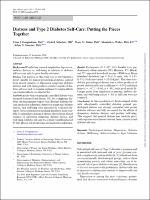Please use this identifier to cite or link to this item:
https://hdl.handle.net/20.500.12202/9362Full metadata record
| DC Field | Value | Language |
|---|---|---|
| dc.contributor.author | Gonzalez, Jeffrey S. | - |
| dc.contributor.author | Hoogendoorn, C. J. | - |
| dc.contributor.author | Schechter, C. B. | - |
| dc.contributor.author | Llabre, M. M. | - |
| dc.contributor.author | Walker, E. A. | - |
| dc.date.accessioned | 2023-10-24T19:32:54Z | - |
| dc.date.available | 2023-10-24T19:32:54Z | - |
| dc.date.issued | 2021 | - |
| dc.identifier.citation | Hoogendoorn, C. J., Schechter, C. B., Llabre, M. M., Walker, E. A., & Gonzalez, J. S. (2021). Distress and type 2 diabetes self-care: Putting the pieces together. Annals of Behavioral Medicine: A Publication of the Society of Behavioral Medicine, 55(10), 938–948. https://doi.org/10.1093/abm/kaaa070 | en_US |
| dc.identifier.issn | Online ISSN 1532-4796 Print ISSN 0883-6612 | - |
| dc.identifier.uri | https://academic.oup.com/abm/article/55/10/938/5904067#304612414 | en_US |
| dc.identifier.uri | https://hdl.handle.net/20.500.12202/9362 | - |
| dc.description | Scholarly article / Open access | en_US |
| dc.description.abstract | _Abstract_ _Background_ Conflicting research emphasizes depression, diabetes distress, or well-being in relation to diabetes self-care and risk for poor health outcomes. _Purpose_ The purpose of this study was to test whether a latent variable for general psychological distress derived from shared variance of depression symptoms, diabetes distress, and well-being predicts a latent variable of diabetes self-care and to examine evidence for unique effects once shared effects are adjusted for. _Methods_ Adults with suboptimally controlled diabetes were recruited from the South Bronx, NY, for a telephonic diabetes self-management support trial. Baseline diabetes self-care, medication adherence, depression symptoms, diabetes distress, and well-being were measured by validated self-report. Structural equation modeling specified a latent variable for general psychological distress derived from shared variance of depression symptoms, diabetes distress, and well-being. Diabetes self-care was a latent variable indicated by diet, glucose self-monitoring, and medication adherence. _Results_ Participants (N = 627, 65% female) were predominantly ethnic minority (70% Hispanic; 45% Black) and 77% reported household income <$20K/year. Mean (standard deviation) age = 56 (12) years; A1c = 9.1% (1.9%); body mass index = 32 (8) kg/m2. The latent variable for psychological distress was a robust predictor of poorer diabetes self-care (coefficient = −0.59 [confidence interval = −0.71, −0.46], p < .001) with good model fit. Unique paths from depression symptoms, diabetes distress, and well-being (all ps > .99) to self-care were not observed. _Conclusions_ In this population of disadvantaged adults with suboptimally controlled diabetes, general psychological distress was strongly associated with poorer diabetes self-care and fully accounted for the effects of depression, diabetes distress, and positive well-being. This suggests that general distress may underlie previously reported associations between these constructs and diabetes self-care. | en_US |
| dc.description.sponsorship | Acknowledgments Data from this study were presented at the Society of Behavioral Medicine 35th Annual Meeting in Philadelphia, PA (April 2014). Funding This study was supported by the National Institute of Diabetes and Digestive and Kidney Diseases (R18 DK078077), Einstein-Mount Sinai Diabetes Research Center, Albert Einstein College of Medicine (P30 DK020541), and the New York Regional Center for Diabetes Translation Research (P30 DK111022). C.J.H. is also supported by the Drs. David and Jane Willner Bloomgarden Family Fellowship Fund. J.S.G. is supported by grants R01 DK104845, R18 DK098742, R01 DK121298, and R01 DK121896 from the National Institutes of Health. Funding sources had no involvement in study design, data collection, analysis and interpretation of data, or the writing of the report. | en_US |
| dc.language.iso | en_US | en_US |
| dc.publisher | Oxford UP | en_US |
| dc.relation.ispartofseries | Annals of Behavioral Medicine: A Publication of the Society of Behavioral Medicine;55(10) | - |
| dc.rights | Attribution-NonCommercial-NoDerivs 3.0 United States | * |
| dc.rights.uri | http://creativecommons.org/licenses/by-nc-nd/3.0/us/ | * |
| dc.subject | Psychological distress | en_US |
| dc.subject | Depression | en_US |
| dc.subject | Diabetes distress | en_US |
| dc.subject | Well-being | en_US |
| dc.subject | Self-care behavior | en_US |
| dc.subject | Type 2 diabetes | en_US |
| dc.title | Distress and type 2 diabetes self-care: Putting the pieces together | en_US |
| dc.type | Article | en_US |
| dc.identifier.doi | https://doi.org/10.1093/abm/kaaa070 | en_US |
| local.yu.facultypage | https://www.yu.edu/faculty/pages/gonzalez-jeffrey | en_US |
| Appears in Collections: | Ferkauf Graduate School of Psychology: Faculty Publications | |
Files in This Item:
| File | Description | Size | Format | |
|---|---|---|---|---|
| Gonzalez 2021 Distress and type 2 diabetes kaaa070 OA.pdf | 569.65 kB | Adobe PDF |  View/Open |
This item is licensed under a Creative Commons License

